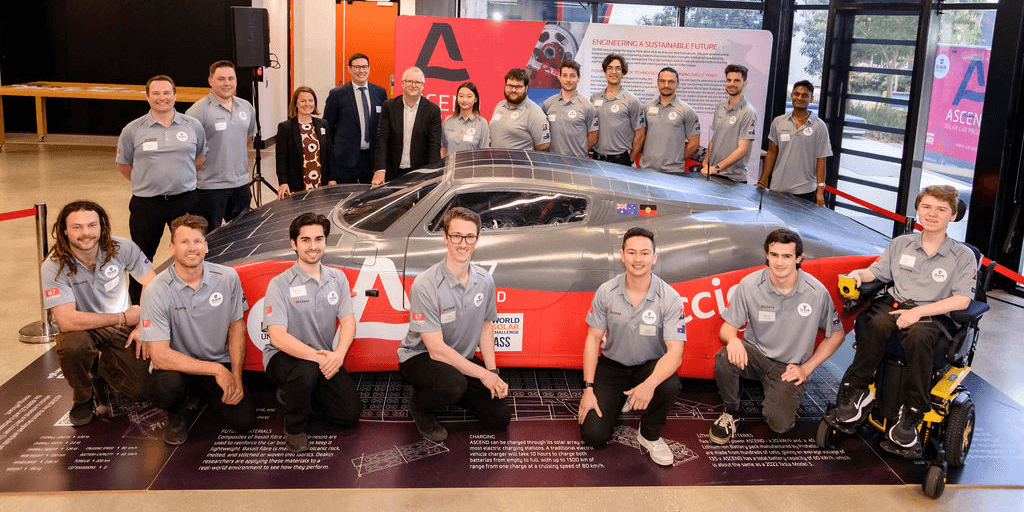- Australia
- Go to acciona.com
- The ASCEND team is the only Victorian entry, alongside 41 other teams from 23 countries, with the aim of pushing the limits of technological innovation while travelling through the Australian outback in a vehicle powered only by the energy of the sun.

Deakin University’s Vice-Chancellor Professor Iain Martin has farewelled 14 students and six staff from the School of Engineering as they set off to take part in the 2023 Bridgestone World Solar Challenge (BWSC), a design competition to discover the world’s most efficient electrical car.
The ASCEND team is the only Victorian entry, alongside 41 other teams from 23 countries, with the aim of pushing the limits of technological innovation while travelling through the Australian outback in a vehicle powered only by the energy of the sun.
It is the first time the Deakin University and ACCIONA Energía have participated.
Caroline Bommes, General Manager of Brand & Marketing at ACCIONA Energía said "The World Solar Challenge is not a race; it's an endurance test that requires teamwork, agile and strategic decision-making, and a relentless focus on the finish line."
"The ASCEND car is not just a car; it reflects ACCIONA's core values of innovation, teamwork, and solid engineering. These skills and values are essential in the development of sustainable technology and energy solutions and every student who has worked on the project will be able to take this with them when they embark on their future careers."
Deakin and ACCIONA both have shared values and that's precisely why our partnership with is so valuable. Deakin provides students with the practical experience they need to thrive in the real world and with renewables growing at such a pace in Australia, and it often comes with new and complex problems. This is a great example of how to create solutions for these problems with a sustainable mindset.
“I’d like to congratulate the Deakin ASCEND team on their determination, perseverance and focus on designing and building a practical solar vehicle. This is exactly the kind of project that aligns with Deakin’s values and commitment to sustainability and energy.”
Deakin has set the goal of carbon neutrality by 2025 and being carbon negative by 2030.
“This priority is written into our 10-year strategic plan and is very deliberately linked to our activities across education, research and innovation,” said Vice-Chancellor Professor Martin.
“With the energy transition upon us, this project has provided a platform for students to engage with a real-world challenge – to design and build a solar car fit to be driven on our roads.”
The race starts on October 22 in Darwin and will finish 3000km later in Adelaide. Deakin ASCEND will compete with ten other teams in the Cruiser class; concept cars that may come to market one day.
Cruiser Class cars must be practical, seat a minimum of two people and manage their energy requirements over 1000 km stages and meet strict time targets.
During the event they will be part of experiments conducted by Australia’s peak scientific body CSIRO, measuring the impact of electric vehicles on the electricity supply network.
Once in Adelaide Cruiser Class teams present their cars to a panel of judges who will award a ‘practicality’ score, emulating the real-world problem industrial designers face every day.
Head of the School of Engineering Professor Ben Horan said:
“Participating in the BWSC is an opportunity to showcase Deakin’s strengths in sustainable innovation through additive manufacturing, engineering design and product development, and to provide exceptional learning experiences.
Since 2019, the ASCEND Solar Car Project has engaged more than 1000 students, representing disciplines from mechanical, electrical and aerodynamics engineering to information technology, business, marketing, and communication. Participation in this real-world project gives students hands-on experience and an embedded knowledge of how the industry works.”
The challenge, said Vice-Chancellor Professor Iain Martin, comes at a time when Australia desperately needs more engineers. Australia will be an estimated 50,000 engineers short by 2030. There is no more important time than now to undertake such a challenge that inspires and challenges the next generation of engineers. We couldn’t be prouder to see our Deakin team on the world stage.”